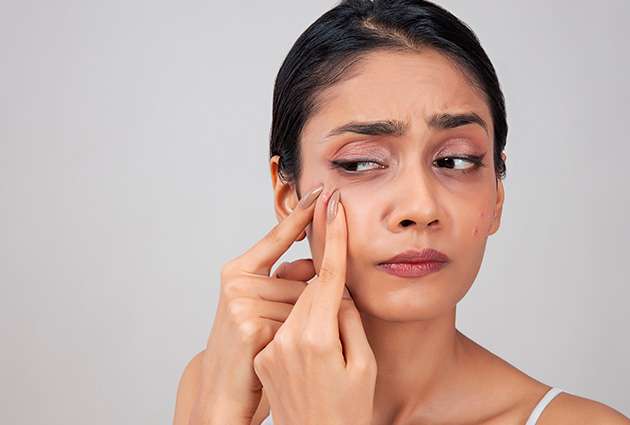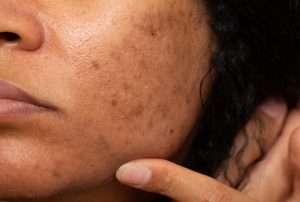Pigmentation serum for face : Causes, treatment & how to choose right serum

Introduction
Pigmentation issues on the face, such as dark spots and hyperpigmentation, can be a source of concern for many individuals. Fortunately, there are various skincare products available in the market to address these concerns. One popular option is pigmentation serums for face. In this article, we will explore what pigmentation serums are, how they work, and how to choose the right serum for your specific needs. We will also discuss the causes of pigmentation and effective treatment options. So, let’s dive in and discover the world of pigmentation serums for face.
Related product – pigmentation serum
Pigmentation Serum and How It Works
A pigmentation serum is a skin care product for dark spots formulated specifically to target and reduce pigmentation issues on the face. These pigmentation removal serums often contain active ingredients that work to lighten dark spots, even out skin tone, and reduce the appearance of hyperpigmentation. They are typically lightweight and easily absorbed into the skin, allowing the active ingredients to penetrate deeply and deliver their benefits.
The active ingredients in the serums for pigmentation on face can vary depending on the brand and formulation. However, some common ingredients found in these pigmentation serums include:
1. Vitamin C:
Known for its brightening properties, vitamin C helps to inhibit the production of melanin, the pigment responsible for dark spots.
2. Retinol:
This derivative of vitamin A promotes cell turnover and helps to fade pigmentation over time.
3. Kojic Acid:
Derived from mushrooms, kojic acid has skin-lightening properties and can help reduce the appearance of pigmentation.
4. Alpha Arbutin:
This ingredient inhibits tyrosinase, an enzyme involved in the production of melanin, thereby reducing pigmentation.
5. Niacinamide:
Also known as vitamin B3, niacinamide helps to even out skin tone and reduce the appearance of hyperpigmentation.
When applied to the skin, pigmentation serums work by targeting the underlying causes of pigmentation, such as excess melanin production or post-inflammatory hyperpigmentation. These pigmentation serums for face penetrate the skin’s layers, delivering the active ingredients to the affected areas and helping to fade dark spots over time. Regular use of a pigmentation face serum can lead to a more even and radiant complexion.
Related Article –The Best Serums For De Pigmentation: Find Out More About & How They Work
Choose Right Pigmentation Serum for You
With the abundance of pigmentation serums for the face available in the market, choosing the right one for your specific needs can be overwhelming. Here are some factors to consider when selecting a pigmentation serum:
1. Skin Type
Consider your skin type when choosing a de-pigmentation serum. If you have sensitive skin, look for pigmentation serums that are formulated with gentle ingredients to avoid any potential irritation. For oily or acne-prone skin, opt for oil-free or non-comedogenic serums for pigmentation to prevent clogged pores.
2. Active Ingredients
Look for pigmentation serums for the face that contain active ingredients known for their effectiveness in reducing pigmentation. Vitamin C, retinol, kojic acid, alpha arbutin, and niacinamide are some ingredients to look for in a pigmentation removal serum. Each of these ingredients works differently, so choose based on your specific pigmentation concerns.
3. Formulation and Texture
Consider the formulation and texture of the pigmentation serum. Some pigmentation serums for face come in lightweight, water-based formulations, while others may have a more viscous texture. Choose a formulation that suits your preferences and is comfortable to use.
4. Brand Reputation and Reviews
Research the brand reputation and read reviews from other users before purchasing the best serum for pigmentation. Look for reviews that mention positive results in reducing pigmentation and improving skin tone. Brands with a good reputation and positive customer feedback are more likely to deliver effective results.
5. SPF Protection
Sun exposure can worsen pigmentation issues, so choosing a serum for pigmentation that offers sun protection is beneficial. Look for pigmentation serums that contain SPF or can be used in conjunction with sunscreen to protect your skin from harmful UV rays
Suitable Pigmentation Serum for Face
Choosing the right pigmentation removal serum for your specific needs can be a daunting task. Here are some tips to help you determine which serum for pigmentation is right for you:
Identify your specific pigmentation concerns:
Are you dealing with dark spots, melasma, or post-inflammatory hyperpigmentation? Understanding your specific pigmentation issues will help you narrow down the options to choose the best serum for pigmentation.
Consult a skincare professional:
If you’re unsure about which pigmentation serum to choose, it’s always a good idea to consult a dermatologist or skincare professional. They can assess your skin condition and recommend the most suitable serum for your needs.
Read product labels and descriptions:
Take the time to read the labels and descriptions of different pigmentation serums. Look for key ingredients that address your specific pigmentation concerns and match them to your skincare goals.
Consider your skin type:
As mentioned earlier, consider your skin type when selecting pigmentation serums for face. If you have sensitive skin, opt for pigmentation face serums that are fragrance-free and formulated for sensitive skin.
Start with a patch test:
Before applying the serum for pigmentation on the face, perform a patch test on a small area of your skin. This will help you determine if you have any adverse reactions to the product.
Remember that everyone’s skin is unique, and what works for someone else may not necessarily work for you. It may take some trial and error to find the perfect pigmentation serum that addresses your specific concerns and suits your skin.
Best Serum for Removing Pigmentation
The best serum for pigmentation depends on various factors, including the severity of the pigmentation, individual skin type, and personal preferences. However, some pigmentation serums for face have gained popularity for their effectiveness in reducing pigmentation and one of them is Plix 2% Alpha Arbutin Pineapple Face Serum.
Plix’s 2% Alpha Arbutin & 10% Niacinamide Pineapple face serum for pigmentation is specifically formulated to decrease the production of melanin. By doing so, it effectively diminishes the visibility of different types of pigmentation, leading to more radiant and even-tone skin as time goes on. By incorporating this pigmentation serum for face into your regular skincare routine, you can effectively combat pigmentation concerns.
Pigmentation: Tips for Pigmentation Removal
Removing pigmentation is a common desire, but it’s important to manage expectations. While there is no overnight solution for pigmentation removal, consistent use of effective pigmentation serums for face and a good skincare routine can help fade pigmentation over time. Here are some steps you can take to expedite the process:
Consistent use of pigmentation serums:
Apply the pigmentation serum as directed, usually once or twice daily, to the affected areas. Consistency is key for seeing results.
Sun protection:
Protect your skin from harmful UV rays by wearing sunscreenwith a high SPF every day, even when it’s cloudy. Sun exposure can worsen pigmentation, so diligent sun protection is crucial for faster results.
Exfoliation:
Regular exfoliation can help remove dead skin cells and promote cell turnover, which can help fade pigmentation. Use a gentle exfoliant or consult a skincare professional for recommendations.
Avoid picking or squeezing:
Picking at pigmented spots can worsen the condition and lead to scarring. Avoid the temptation to pick or squeeze the affected areas.
Stay hydrated and eat a balanced diet:
Drinking plenty of water and maintaining a healthy diet can contribute to overall skin health. Hydrated and nourished skin may heal and recover faster.
Ways to Deal with Pigmentation
Clearing pigmentation completely can be agradual process that requires patience and consistency. While complete clearance may not always be possible, there are treatment options that can significantly fade pigmentation and improve the overall appearance of the skin. Here are some effective treatments:
Topical Pigmentation Serums:
As discussed earlier, pigmentation serums containing active ingredients such as vitamin C, retinol, kojic acid, alpha arbutin, and niacinamide can help fade pigmentation over time. Consistent use of these serums for pigmentation can contribute to a more even skin tone.
Chemical Peels:
Chemical peels involve the application of a chemical solution to the skin, which exfoliates the outer layer and promotes cell turnover. This can help fade pigmentation and reveal fresher, more evenly toned skin. It’s best to consult a dermatologist or skincare professional for appropriate peel strength and frequency.
Laser Treatments:
Laser treatments, such as intense pulsed light (IPL) or fractional lasers, can target pigmentation by breaking up excess melanin in the skin. These treatments stimulate collagen production and can lead to a more even complexion. Consult a dermatologist or skincare professional to determine the best laser treatment for your specific needs.
Microdermabrasion:
Microdermabrasion is a non-invasive procedure that involves the use of a diamond-tipped wand or crystals to exfoliate the outer layer of the skin. This treatment helps remove dead skin cells and can improve the appearance of pigmentation.
Prescription Topicals:
In some cases, prescription topicals containing ingredients like hydroquinone, tretinoin, or corticosteroids may be recommended by a dermatologist to treat stubborn pigmentation. These treatments should be used under medical supervision.
Remember, pigmentation is a complex condition, and results may vary depending on factors such as the severity of pigmentation, individual skin type, and consistency of treatment. It’s best to consult a dermatologist or skincare professional to determine the most suitable treatment options for your specific needs.
Takeaway
Pigmentation serums for face can be effective in addressing pigmentation issues such as dark spots and pigmentation. These serums for pigmentation contain active ingredients that work to lighten pigmentation, even out skin tone, and improve the overall appearance of the skin. When choosing a pigmentation serum, consider factors such as your skin type, active ingredients, formulation, and brand reputation.
To choose the best serum for pigmentation, identify your specific pigmentation concerns, consult a skincare professional if needed, and read product labels and descriptions. Additionally, consider factors such as SPF protection, which can help prevent further pigmentation issues caused by sun exposure.
While there is no miracle product that removes pigmentation overnight, consistent use of a suitable pigmentation serum, along with sun protection and a healthy skincare routine, can help fade pigmentation over time. It’s important to manage expectations and understand that individual results may vary.
Remember, if you’re uncertain about the best course of action for your pigmentation concerns, it’s always advisable to consult a dermatologist or skincare professional for personalized advice and treatment options.
Frequently Asked Questions (FAQs)
Can pigmentation serums be used on all skin types?
Yes, pigmentation serums are formulated to be suitable for various skin types. However, individuals with sensitive skin should opt for serums for pigmentation with gentle ingredients and perform a patch test before applying the product to the entire face.
How long does it take to see results from pigmentation serums?
Results from pigmentation removal serums vary from person to person. It may take several weeks or even months of consistent use to see noticeable improvements in pigmentation. Patience and consistency are key.
Can I expect a reduction in dark spots using Plix Pineapple face serum?
Yes! Plix Alpha Arbutin Pineapple face serum for pigmentation combines a fruit+actives formula with active ingredients like 10% Niacinamide and 2% Alpha Arbutin. This unique blend of ingredients works in harmony to address common skin concerns such as dark spots, discoloration, pigmentation, and uneven skin tone.
Are there any natural remedies for pigmentation?
While pigmentation serums for face with active ingredients have been shown to be effective, some natural remedies may help lighten pigmentation to some extent. These include ingredients like lemon juice, aloe vera, turmeric, and green tea. However, natural remedies may not be as potent or have the same scientific evidence supporting their efficacy as formulated skincare products.
What makes the ingredients of Plix pigmentation serum special?
Plix 2% Alpha Arbutin pigmentation face serum reduces pigmentation and dark spots by decreasing melanin production. It also contains 10% Niacinamide to even out skin tone and brighten the complexion. Paeonia Albiflora Flower extract moisturizes and provides antioxidants, while pineapple extract’s Bromelain enzyme has anti-inflammatory properties.
Can pigmentation return after it has faded?
Pigmentation can return even after using pigmentation removal serum, primarily if the underlying causes, such as sun exposure or hormonal factors, are not addressed. Maintaining a consistent skincare routine, including sun protection, is important to minimize the risk of pigmentation recurrence.
Will my skin feel stretched or dry or oily after the application of Plix face serum for pigmentation?
No! Plix Pineapple pigmentation serum is a lightweight serum designed to target pigmentation and dark spots. It is free from mineral oils, making it ideal for those who want to avoid greasy skin. This serum for pigmentation on face provides intense hydration, leaving your skin nourished and refreshed without any dryness after use.
Are there any side effects of using pigmentation serums?
Some individuals may experience mild side effects such as temporary redness, dryness, or irritation when using pigmentation serums. If you experience persistent or severe side effects, discontinue use and consult a dermatologist.
Will Plix’s pineapple pigmentation face serum enhance my skin complexion?
Yes! Plix Pineapple face serum for pigmentation is a powerful solution for achieving a brighter and more even skin tone. With its high concentration of 2% Alpha Arbutin, this pigmentation serum effectively lightens the skin and is 9 times more effective than Beta Arbutin. Alongside this, the pigmentation face serum contains 10% Niacinamide, which helps reduce melanin production and visibly diminishes dark spots, resulting in a rejuvenated and radiant complexion.
Should I use sunscreen along with pigmentation serums?
Absolutely! Sunscreen is crucial for managing pigmentation concerns. Exposure to the sun can exacerbate pigmentation and impede its fading process. It is recommended to select a broad-spectrum sunscreen with an SPF of 30 or above and apply it generously each day along with the best serum for pigmentation.














